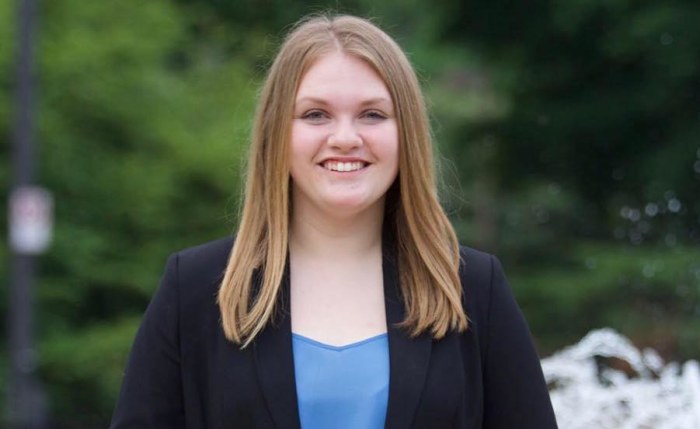Rachel Junck‘s victory in the Ames City Council Ward 4 runoff election on December 3 was historic in two ways. The 20-year-old engineering major is the youngest second-youngest woman elected to any office in Iowa* and the first female Iowa State University student to win a seat on the council of our state’s seventh-largest city.
The outcome in Ames was also in line with a recent trend: candidates with strong ties in business circles have not performed as well in local elections in larger Iowa communities.
Junck defeated two-term city council member Chris Nelson, who works in a multi-generational family business. In addition to the advantages of incumbency, Nelson had the kind of connections that have fueled many successful bids for local office. He’s a board member and treasurer of the Ames Chamber of Commerce, a member of Rotary Club, and the city’s representative on the Ames Economic Development Commission.
Junck surprised many by nearly gaining the 50 percent of the vote she needed to win the seat outright on November 5. I expected the business community to kick into high gear to elect Nelson in the runoff, but according to unofficial returns on December 3, Junck received 712 votes (54 percent) to Nelson’s 587 votes (45 percent). Unusually high student turnout was part of the story. But this progressive candidate’s win in Ames was not an isolated case.
Last month, retired firefighter Dave Boesen took 65 percent of the vote against Steve Schmitt to win the at-large council seat in Waterloo, Iowa’s sixth-largest city. Schmitt was a two-term incumbent on the council as well as a senior executive in a telecommunications company. He has worked in that field for decades and explicitly campaigned on his private-sector experience, saying his business background would benefit taxpayers.
In Urbandale, the state’s twelfth-largest city, progressives won two of the three city council seats on the ballot this year. The current leader of that Des Moines suburb’s chamber of commerce finished last in a field of six candidates.
Perhaps the business community isn’t losing its touch so much as Democrats and labor-backed candidates have stepped up their GOTV for local races, in reaction to the Republican trifecta’s overreaches since 2017. On the other hand, voters in Iowa City (the state’s fifth-largest municipality) elected the “Core Four” progressive slate in 2015, before the GOP had unchecked power in Iowa. Chamber of commerce types–what area blogger John Deeth called “the developer-landlord class”–had dominated Iowa City’s council for many years.
I’d welcome tips or guest commentaries from readers with insight on what factors may be driving this encouraging trend in Iowa politics.
For now, Bleeding Heartland congratulates Junck on securing her place in the history books.
*UPDATE/CORRECTION: Junck’s campaign learned on December 4 that an 18-year-old woman was elected to the Missouri Valley city council in 2005. So Junck is the second-youngest woman elected to public office in Iowa.


3 Comments
I'd also appreciate insight...
…on what happened in the Des Moines mayoral race.
PrairieFan Thu 5 Dec 12:18 AM
Des Moines
My take on Des Moines is one, the number of candidates for each seat indicated much dissatisfaction with the status quo, and, two, the campaigns were all about the status quo. In the forums and the broadcasted mayoral debate, the questions were not provocative. I heard one mention of the new zoning ordinance at those events. I heard much about potholes and which special interest group(s) should receive property tax breaks. I wanted a candidate that was going to pound the message that the city council should not determine the size or type of out buildings or go on spending sprees because they now have a one-cent sales tax. (Schools are not the city council, but the question of do we need to spend tax dollars on a stadium simply because we have nothing else on which we can spend it is similar to what the council is now doing with the LOSST money.) I would like to know if those other communities had resources outside the traditional media or neighborhood associations by which the non-business candidates were able to spread their messages.
Outlier21st Thu 5 Dec 5:01 AM
Thank you...
…for taking the time to provide an interesting viewpoint I hadn’t read/heard before.
PrairieFan Thu 5 Dec 5:03 PM